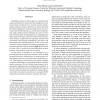Free Online Productivity Tools
i2Speak
i2Symbol
i2OCR
iTex2Img
iWeb2Print
iWeb2Shot
i2Type
iPdf2Split
iPdf2Merge
i2Bopomofo
i2Arabic
i2Style
i2Image
i2PDF
iLatex2Rtf
Sci2ools
RTAS
2008
IEEE
2008
IEEE
Hybrid Timing Analysis of Modern Processor Pipelines via Hardware/Software Interactions
Embedded systems are often subject to constraints that require determinism to ensure that task deadlines are met. Such systems are referred to as real-time systems. Schedulability analysis provides a firm basis to ensure that tasks meet their deadlines for which knowledge of worst-case execution time (WCET) bounds is a critical piece of information. Static timing analysis techniques are used to derive these WCET bounds. A limiting factor for designing realtime systems is the class of processors that can be used. Typically, modern, complex processor pipelines cannot be used in real-time systems design. Contemporary processors with their advanced architectural features, such as out-of-order execution, branch prediction, speculation, prefetching, etc., cannot be statically analyzed to obtain tight WCET bounds for tasks. This is caused by the non-determinism of these features, which surfaces in full only at runtime. In this paper, we introduce a new paradigm to perform timing analysis of...
| Added | 01 Jun 2010 |
| Updated | 01 Jun 2010 |
| Type | Conference |
| Year | 2008 |
| Where | RTAS |
| Authors | Sibin Mohan, Frank Mueller |
Comments (0)

